
-
By:
- cierra
- No comment
john deere tractor value guide
The John Deere Tractor Value Guide provides insights into determining the worth of John Deere tractors, covering factors like model year, condition, and market trends to help owners and buyers make informed decisions.
Understanding the Importance of Tractor Valuation
Accurate tractor valuation is crucial for buyers, sellers, and owners to make informed decisions. It helps determine fair market prices, assess depreciation, and understand maintenance impacts. Proper valuation ensures transparency in transactions, guiding investments and financial planning. For John Deere tractors, factors like model year, condition, and upgrades significantly influence value. Understanding these elements helps owners maintain or boost their tractor’s worth over time, ensuring optimal returns when selling or upgrading equipment.
A Brief History of John Deere Tractors
John Deere tractors trace their roots to 1837 when John Deere founded the company, initially producing plows. The first tractor, the Waterloo Boy, debuted in 1892, revolutionizing agriculture. Over decades, innovations like the Model D in 1923 and the iconic two-cylinder engines solidified John Deere’s reputation. Today, the brand is synonymous with quality and reliability, offering a wide range of tractors from compact models like the D100 to advanced, high-tech machinery, meeting the evolving needs of farmers and enthusiasts worldwide.
Factors Affecting the Value of John Deere Tractors
Model year, condition, hours of use, maintenance history, and attachments significantly influence tractor value. Upgrades and overall upkeep also play crucial roles in determining resale worth.
Model Year and Condition
Model year significantly impacts tractor value, with newer models typically holding higher worth due to advanced technology and improved efficiency. The condition of the tractor, including engine performance, tire quality, and overall maintenance, further influences its value. Well-maintained tractors with lower hours command higher prices, while older models may see depreciation. Upgrades or customizations can also enhance value, depending on market demand and functionality. Current trends show a preference for models with specific features, affecting their resale potential.
Hours of Use and Maintenance History
Hours of use and maintenance history are critical in determining tractor value. Lower hour tractors typically retain higher value, as they indicate less wear and tear. A well-documented maintenance history, including regular servicing and repairs, can significantly boost resale value. Buyers often prioritize tractors with consistent upkeep, as it reflects reliability and longevity. Conversely, high-hour tractors or those with neglected maintenance may see reduced value, making maintenance records essential for transparency and trust in transactions.
Attachments and Upgrades
Attachments and upgrades significantly influence a John Deere tractor’s value. Accessories like backhoes, loaders, and mower decks enhance functionality, appealing to buyers seeking versatility. Upgrades such as improved engines, transmissions, or technology features can boost value further. Tractors with additional attachments are often in higher demand, as they offer multi-purpose capabilities. Well-integrated upgrades can justify a higher price point, making the tractor more attractive to potential buyers in the market.
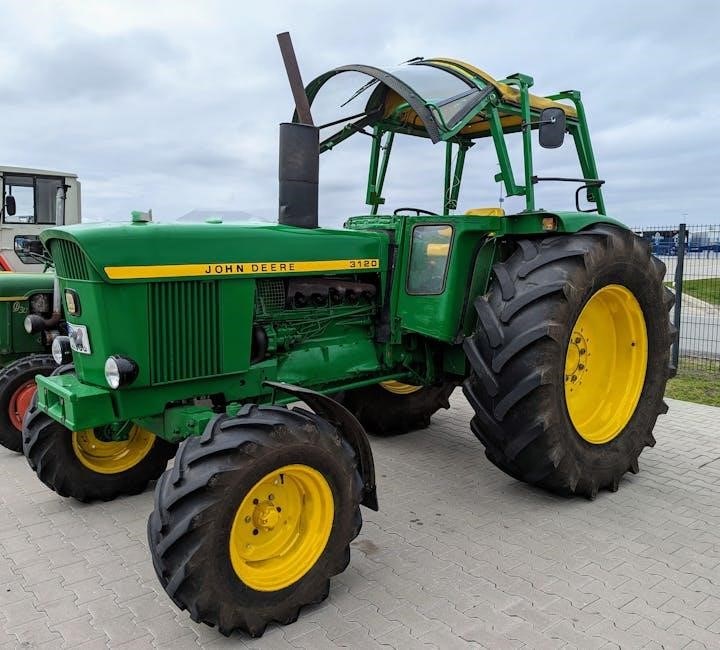
Popular John Deere Tractor Models and Their Value
John Deere tractors, like the D100 and D110, are highly sought after for their reliability and performance. Vintage models, such as the 2010 and 2020, also hold strong value.
Current Models: D100, D110, D120, D130
John Deere’s current models, such as the D100, D110, D120, and D130, are popular for their power and efficiency. These tractors are ideal for residential and small-scale agricultural use, offering durability and modern features. Their value is influenced by factors like hours of use, maintenance history, and attachments. Tractors with lower hours and proper servicing typically retain higher value. Additionally, upgrades and accessories can enhance their functionality and appeal to potential buyers, making them a smart investment for many users.
Vintage Models: 2010, 2020, 2030
Vintage John Deere models like the 2010, 2020, and 2030 hold significant value among collectors and enthusiasts. Produced in the mid-20th century, these tractors are sought after for their durability and historical significance. Their value depends on condition, originality, and rarity. Well-maintained models with original parts command higher prices, especially at auctions. Restoration projects can also increase their worth, making them a valuable investment for those passionate about classic agricultural machinery.
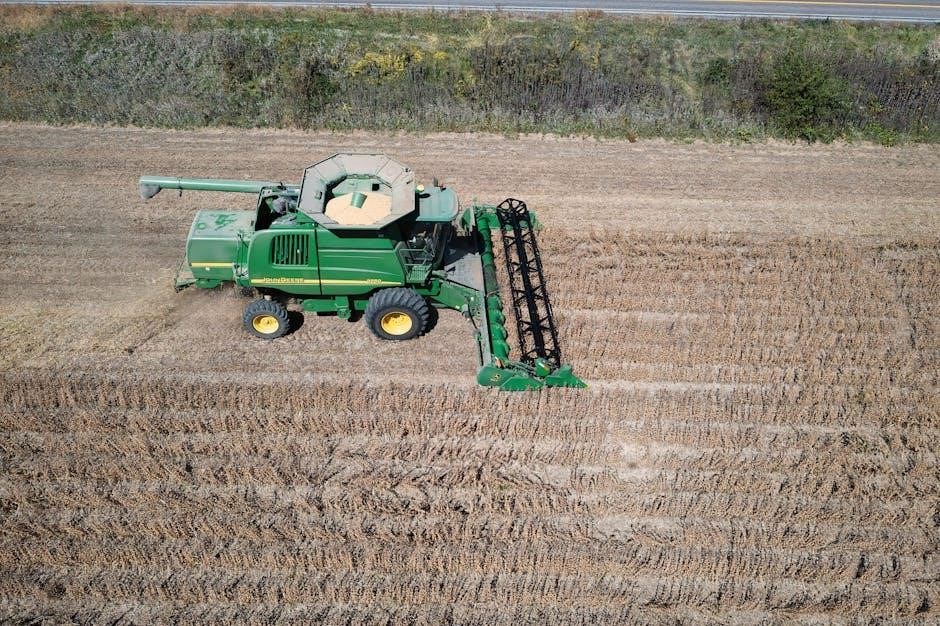
Determining the Value of Your John Deere Tractor
Evaluating your John Deere tractor’s value involves assessing model, condition, and usage. Use official pricing guides, online marketplaces, and understand depreciation rates for accurate valuation.
Using Pricing Guides and Online Marketplaces
Pricing guides and online marketplaces are essential tools for determining tractor value. Official John Deere guides provide detailed pricing based on model year, condition, and features. Online platforms like eBay, Craigslist, and tractor forums allow comparing similar models and their selling prices. Additionally, services like TractorBlue Book offer valuations based on market data. These resources help owners and buyers understand depreciation rates and regional price variations, ensuring accurate and fair assessments. Regular updates keep valuations current, reflecting market trends and demand shifts.
Understanding Depreciation Rates
Depreciation rates for John Deere tractors vary based on model year, usage hours, and maintenance history. Newer models with low hours and proper care retain value better, while older or heavily used tractors depreciate faster. Factors like mechanical issues or outdated technology can accelerate depreciation. Tracking market trends and comparing similar models helps estimate depreciation accurately. Regular maintenance and upgrades can slow value decline, making tractors more attractive to buyers. Understanding these patterns is crucial for maximizing resale value and planning investments wisely.
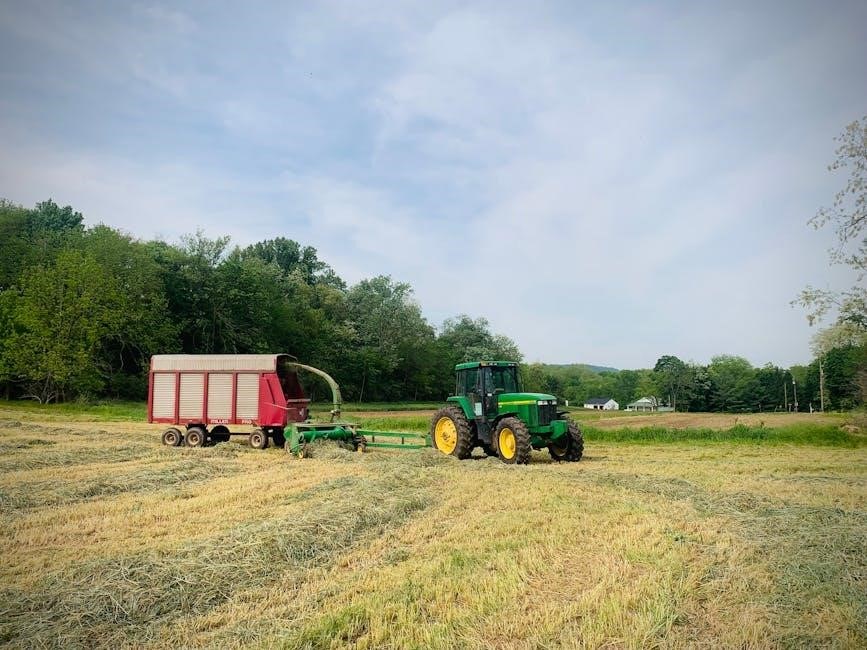
Market Trends in John Deere Tractor Values
Current market trends show increasing demand for John Deere tractors, driven by technological advancements and sustainability efforts; Autonomous and electric models are gaining popularity, while regional demand variations influence values.
Current Market Trends and Forecast
John Deere tractor values are rising due to increased demand for advanced agricultural technology and sustainability. Autonomous electric tractors, set to launch in 2026, are expected to boost market interest. Regional demand variations and economic factors also influence tractor values. Forecast suggests steady appreciation, driven by innovation and environmental focus. Monitoring market trends is crucial for buyers and sellers to make informed decisions.
Regional Variations in Tractor Values
John Deere tractor values vary by region due to differences in demand, economic conditions, and farming practices. Urban areas may see higher prices for compact models, while rural regions favor larger, heavy-duty tractors. Emerging markets often experience fluctuating values based on import costs and local subsidies. Additionally, regional dealership networks, like SunSouth John Deere, influence pricing and availability. Understanding these variations is key to assessing tractor values accurately in different geographic locations.
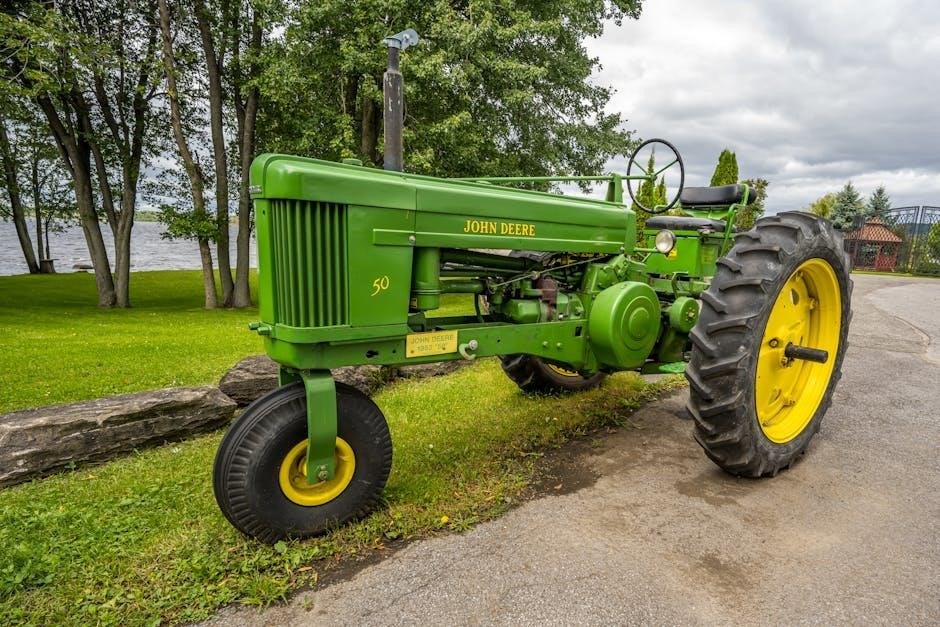
Maintenance and Its Impact on Tractor Value
Regular maintenance significantly influences John Deere tractor value, ensuring optimal performance and extending lifespan. Proper upkeep can prevent costly repairs and boost resale value.
Regular Servicing and Maintenance Tips
Regular servicing is crucial to maintain tractor performance and value. Ensure oil changes, filter replacements, and tire checks are done periodically. Inspect hydraulic systems and batteries regularly. Proper storage and cleaning prevent rust and damage. Adhere to John Deere’s maintenance schedules for optimal results. Addressing issues promptly can prevent costly repairs and extend the tractor’s lifespan, ultimately preserving its value over time.
Common Issues and Repairs
Common issues with John Deere tractors include engine backfiring, unexpected operation after shutdown, and faulty spark plugs or fuel solenoids. Regular inspections can prevent such problems. Hydraulic leaks and battery malfunctions are also frequent. Addressing these promptly with genuine parts ensures reliability and maintains value. Proper diagnostics and timely repairs are essential to avoid costly overhauls, preserving both performance and resale worth.
Buying and Selling Strategies
Research fair market prices, inspect condition and maintenance history, and negotiate based on valuation insights to secure the best deals when buying or selling John Deere tractors.
How to Buy a Used John Deere Tractor
When purchasing a used John Deere tractor, research the model’s history, inspect for wear, and review maintenance records. Test the tractor under load, check for any needed repairs, and compare prices from multiple sources. Consider hiring a mechanic for an inspection. Ensure all attachments and features function properly. Negotiate based on the tractor’s condition and market value to secure a fair deal. Understanding depreciation rates and regional demand can also guide your decision.
How to Sell Your John Deere Tractor
To sell your John Deere tractor effectively, start by assessing its value using pricing guides or professional appraisals. Clean and prepare the tractor, addressing minor repairs to enhance appeal. Gather maintenance records, service history, and any additional documentation. Advertise on platforms like tractor marketplaces, forums, or local classifieds, including high-quality photos and detailed descriptions. Price competitively based on market research, and be transparent about the tractor’s condition. Negotiate fairly, considering offers or trades to close the deal efficiently.
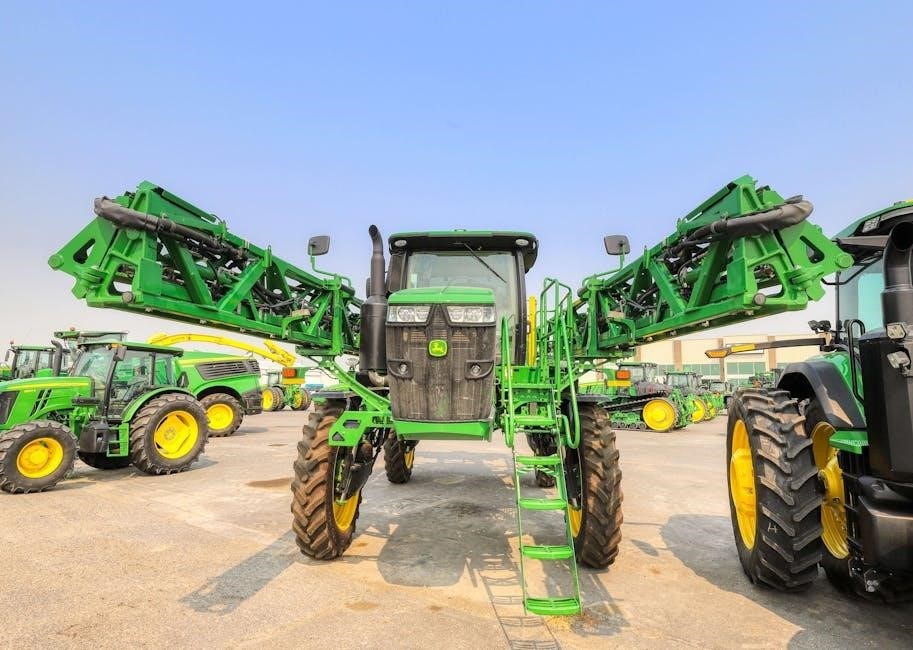
Financing and Insurance Options
Explore financing options like loans or leases for purchasing John Deere tractors. Consider insurance coverage for liability, damage, or theft to protect your investment and ensure financial security.
Financing Options for John Deere Tractors
Financing options for John Deere tractors include loans, leases, and dealer financing programs. John Deere Financial offers tailored solutions with competitive rates and flexible terms. Buyers can choose between fixed or variable interest rates, depending on their financial situation. Leasing options allow farmers and homeowners to access equipment with lower upfront costs. Additionally, special promotions and incentives are often available, making it easier to acquire a tractor while managing cash flow effectively.
Insurance Considerations
Insurance for John Deere tractors is essential to protect against theft, damage, or liability. Policies vary based on usage, with options for agricultural or residential equipment. Comprehensive coverage includes accidental damage, while collision coverage handles accidents. Liability insurance is crucial for protecting against third-party claims. Additional coverage for attachments or vandalism may be needed. It’s important to compare insurance providers and tailor policies to specific needs, ensuring adequate protection at a reasonable cost.
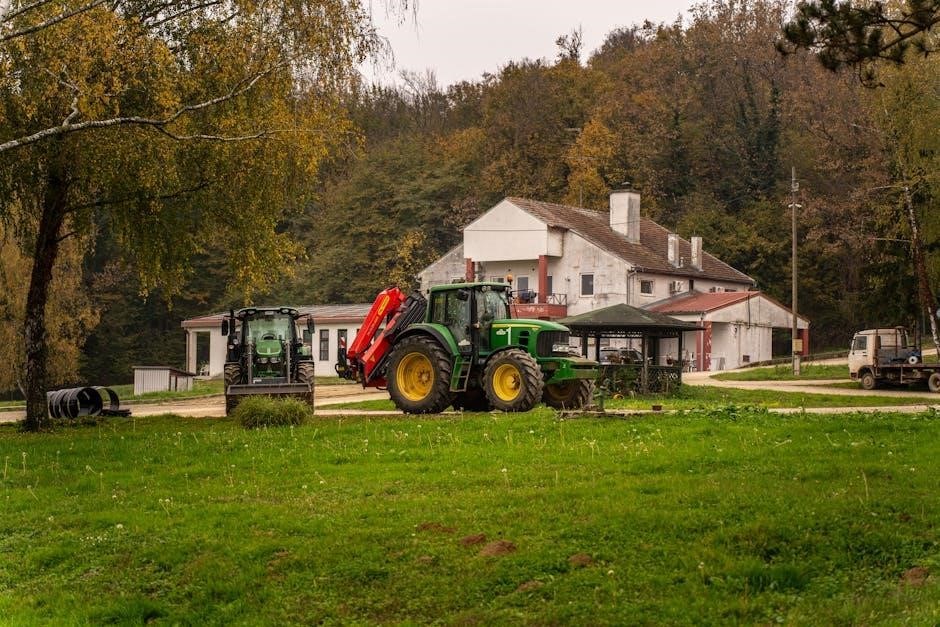
Accessories and Upgrades
John Deere tractors can be enhanced with various accessories like backhoes, loaders, and mowing decks, boosting functionality and value. Upgrades such as autosteer and GPS improve efficiency.
Popular Accessories for John Deere Tractors
Popular accessories include front-end loaders, backhoes, and mowing decks, which enhance versatility and functionality. Additional upgrades like weather cabs, hydraulic attachments, and GPS systems also boost productivity and comfort, making tractors more valuable for various tasks and improving resale potential.
Upgrading Your Tractor for Maximum Value
The John Deere Tractor Value Guide is an essential resource for understanding and maximizing the value of your tractor. By considering factors like condition, maintenance, and upgrades, you can make informed decisions to protect and enhance your investment. Whether buying, selling, or upgrading, this guide provides valuable insights to ensure your tractor retains its worth and continues to serve you effectively for years to come.